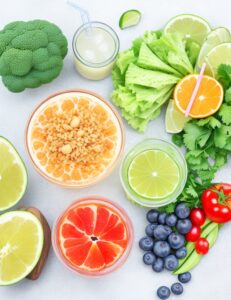
Many people want to lose weight, but the path there may be difficult and complex. Although exercise is essential, our meals and beverages are the basis for effective weight reduction. To achieve a calorie deficit and advance general health, smart dietary decisions are crucial. This blog article will examine suitable foods and drinks for weight loss. You may maximize your efforts to lose weight and get long-lasting benefits by being aware of the importance of nutrition, combining the proper meals, picking the correct drinks, and engaging in mindful eating. So let’s learn the essential diet components to help you lose weight.
Understanding the Role of Nutrition in Weight Loss
The most important idea to comprehend regarding weight reduction is the calorie deficit. In plain English, a calorie deficit happens when you take in less energy than your body requires to maintain weight. This shortage compels your body to draw on its fat reserves for energy, which over time, causes you to lose weight.
It’s crucial to keep in mind, however, that cutting calories is not the only factor in weight reduction. It’s equally important to concentrate on the caloric quality you take in. Nutrient-dense foods provide a variety of necessary vitamins, minerals, and other advantageous substances that promote general health and well-being.
To lose weight permanently, you must eat a balanced diet that contains all the necessary macronutrients (carbohydrates, proteins, and fats) and micronutrients (vitamins and minerals). Each macronutrient has a distinct function:
Lean protein sources, such as chicken breast, fish, tofu, and lentils, must be included in a diet to lose weight. Proteins boost muscular development, aid in tissue repair and building, and provide a sensation of fullness that curbs appetite and prevents overeating.
Choose complex carbs like whole grains (quinoa, brown rice, oats) and high-fiber fruits and vegetables (berries, leafy greens, cruciferous vegetables) to increase your carbohydrate intake. These provide long-lasting energy, fiber for good digestion, and a fullness sensation.
Fats: A balanced diet should include healthy fats such as avocados, almonds, and olive oil. They aid in the creation of hormones, the absorption of nutrients, and the feeling of fullness. However, limiting your consumption is essential since fat has a high-calorie density.
Foods to Incorporate for Weight Loss
Including certain items in your diet significantly improves your weight reduction efforts. Here are some nutrient-rich foods that boost general health and aid in weight loss:
Healthy proteins
It’s crucial to include lean protein sources in your meals if you want to lose weight. They promote muscular development, aid tissue building, and repair, and heighten feelings of fullness. Consider including these possibilities:
chicken breasts without skin
poultry breast
Fish (cod, tuna, and salmon)
Tempeh and tofu
legumes (black beans, chickpeas, and lentils)
Fruits and vegetables high in fiber:
In addition to making you feel fuller longer, high-fiber meals are also good for your digestion and general health. As part of your diet, eat a range of colorful fruits and vegetables, such as:
Strawberry, blueberry, and raspberry berries
Leafy greens (kale, Swiss chard, and spinach)
Cruciferous vegetables (Brussels sprouts, cauliflower, etc.)
Oranges and grapefruits are citrus fruits.
Pears and apples
Complete Grains:
There is more fiber, vitamins, and minerals when whole grains are chosen over processed grains. Additionally, they provide a slower release of energy, which keeps you fuller for longer. Decide on:
Brown rice, quinoa, oats, and whole wheat bread
Barley
Suitable Fats:
Although healthy fats are rich in calories, they may help you lose weight by increasing satiety and supplying vital nutrients. Include:
Avocado Nuts and seeds (chia seeds, almonds, and walnuts)
Almond oil
Nut butter (almond and peanut butter)
Drinks to Aid Weight Loss
While eating is often the main emphasis, drinking also significantly reduces weight. Here are some appropriate beverages to help you on your weight-loss journey:
Water
Water is the only beverage that has no calories at all. Thus, it should be the cornerstone of your hydration strategy. Drinking enough water will help you feel fuller longer and promote digestion and appetite management. Aim to consume eight glasses (64 ounces) or more water daily if you are active.
Green Tea
Numerous health advantages of green tea include the ability to help with weight reduction. It contains antioxidants called catechins, which may speed up metabolism and enhance fat oxidation. Green tea also has a small energizing effect without having as much caffeine as coffee.
Natural teas
For those looking for tasty, calorie-free beverages, herbal teas are a fantastic choice. Certain herbal teas may assist with managing hunger, digestion and reducing bloating. Take into account including these herbal teas in your routine:
Tea with peppermint leaves: It helps calm the stomach and lessen cravings.
Ginger tea: Popular for its ability to soothe inflammation and improve digestion.
Chamomile tea: It Aids in relaxing and may encourage better sleep, which is crucial for managing weight.
Flavored water
Infusing simple water with fruits, herbs, or vegetables may give a pleasant twist without adding additional calories if you find plain water monotonous. Some common combinations are as follows:
Mint with cucumber
Ginger and lemons
berries and basil
Lemon and watermelon
Low-Caloric Drinks:
Low-calorie choices exist if you desire fizzy beverages or a range of tastes. Try to get flavored or sparkling water that hasn’t had any sugar added. Diet sodas are another option, but since they include artificial sweeteners, it’s crucial to drink them in moderation.
Meal Planning and Portion Control
Effective weight reduction requires careful meal planning, portion management, and selecting healthy meals and beverages. The following are important tactics to use in your effort to lose weight:
Plan a Balanced Meal Schedule:
By creating a meal plan, you may choose healthier foods and avoid impulsive, unhealthy decisions. Take into account the following advice while drafting your plan:
Give accurate, unprocessed foods priority by including lean meats, fruits, and vegetables rich in fiber, whole grains, and healthy fats in your meals.
Add a range of nutrients: Make an effort to eat from various food categories to ensure you receive all the necessary vitamins and minerals.
Conscious calorie management: To prevent consuming too many calories, be mindful of your daily caloric demands and spread them out equally among your meals.
Portion Size Control:
Portion management is essential for weight reduction since even nutritious meals, if taken in excess, may lead to weight gain. Following are some helpful pointers for controlling portion sizes:
Use smaller dishes and bowls to increase your sense of fullness with fewer quantities.
Weigh and measure your food: To guarantee precise portions, use measuring cups, kitchen scales, or visual aids.
Aim to eat mindfully: Follow your body’s hunger and fullness signals while eating slowly and mindfully. When you are pleasantly full but not overstuffed, stop eating.
The Role of Mindful Eating
While concentrating on the meals and beverages we consume is critical for weight reduction, eating habits are just as important. The discipline of mindful eating calls for being completely present, conscious of our food choices, and appreciative of each meal. Here are some reasons why mindful eating is essential for weight loss:
Managing portions:
When we practice mindful eating, we better control portion sizes by focusing on our body’s hunger signals and fullness. We allow our brain to receive alerts from our stomach when we are satiated by eating consciously and slowly. This discourages binge eating and encourages a better connection with food.
Knowledge of Food Options:
Being alert when eating enables us to make better decisions about our dietary intake. When conscious of the nutritional worth of our foods, we may consciously choose to include nutrient-dense foods in our meals. In contrast to processed, high-calorie meals, mindful eating urges us to pick complete, nutrient-dense foods.
Cravings and Emotional Eating:
We may identify and treat our emotional eating triggers with mindful eating. It nudges us to stop and consider our feelings before using food as a coping method. To reduce our dependency on food, we explore various coping mechanisms for stress or other emotional states by being completely present with our feelings.
Enhanced Food Enjoyment:
Our meal’s flavor, texture, and perfume can only be fully appreciated by taking time and enjoying each mouthful. Because of our increased sensitivity to the sensory experience of eating, we can feel more satisfied after eating lesser servings. A more satisfying and joyful dining experience results from shifting the emphasis from quantity to quality when practicing mindful eating.
Read –










